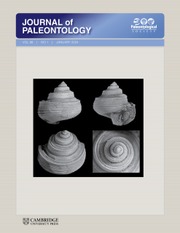It was 3:09 PM on September 2nd, 2003 when I received the email. I had just started my new tenure-track faculty position, and was facing all the daunting responsibilities that come with such a job. The email was from a prospective graduate student called Melanie Hopkins, who stated that she was interested in doing a Ph.D. that would set her up for a career “working as a curator in a natural history or science museum, particularly one active in research.” She had already gained research experience in the laboratories at Stanford University and at the USGS in Denver and Menlo Park, and demonstrated a fierce determination to overcome obstacles (also epitomized by her having played women's rugby). She seemed like she would be an ideal first graduate student—independent and low-maintenance—for an overwhelmed assistant professor, and to this day I remain thankful that (and confused as to why) she took the chance on me as an advisor.
Mel completed an outstanding Ph.D. thesis at the University of Chicago in 2010. She subsequently held prestigious postdoctoral positions at the Field Museum (the Meeker Postdoctoral Fellow, with Scott Lidgard) and in Germany (with Wolfgang Kiessling), before finally being offered a curator position at the American Museum of Natural History where she is now tenured and enjoying a blossoming career. She is fulfilling the dreams that she outlined in that initial email!
Mel's broad research interests—encompassing the evolution of morphology, patterns and processes of morphological diversification, and phylogenetics—are truly interdisciplinary, straddling the fields of geology and biology. Much of her research involves specimen-based work, often using material that she collected herself. By the time she left Chicago she had already accrued considerable experience in both field- and collections-based research. She continues to maintain a strong field component in her research, with projects in the southwestern United States, Anticosti Island, Sweden, and Spitsbergen. It is rare to find such talent for fieldwork, lab work, and quantitative analytical work in one person.
Her Ph.D. research involved quantifying the degree of morphological variation exhibited by well-preserved Cambrian trilobite species, and seeing how this correlated with (1) the geographic ranges of the species, and (2) the stratigraphic durations of the species. Her detailed documentation of the extent to which trilobite morphology was related to geographic range size not only forms an essential benchmark for research into trilobite paleobiology, but also developed a methodology that can be generally applied to any group of organisms (fossil or extant). Assessing the degree to which the extent of morphological variation exhibited by a species correlates with the temporal longevity of that species provides important empirical data advancing our understanding of (trilobite) evolution. To complement the paleontological study, her thesis also involved a stellar project on the structure of geographic variation in extant fiddler crabs. This was only possible because Mel independently established a very productive collaboration with biologist Carl Thurman (University of Northern Iowa). The results of the trilobite and the crab studies represent very useful contributions to the field. Her publication on the phylogenetics and systematics of the Pterocephaliidae was selected by the editorial staff as the best paper in the Journal of Paleontology in 2011. Her more recent studies of disparity changes during extinctions, differential patterns of character evolution among body regions, and methods for time-scaling phylogenetic trees have utilized the morphometric and phylogenetic data from her thesis in ways that were not part of her initial Ph.D. project—great evidence of innovative thinking on her part!
The contributions highlighted above should be evidence enough that Melanie Hopkins is a true rising star of paleontology. However, they represent only a portion of her total body of work. Mel's intellectual breadth and quantitative skills have led to her involvement in many collaborative projects, studying topics including the evolutionary developmental biology of trilobites, the disparity dynamics of ammonoids and echinoids, evolutionary patterns and processes such as stasis and gradualism, and the incorporation of stratigraphic age uncertainty into phylogenetic analyses. Mel continues to position herself as a leader in the study of patterns and processes of phenotypic evolution.
One other noteworthy aspect of Mel's persona that shines out is her appreciation of the importance of scientific outreach to the general public. She recognizes deficiencies in the manner in which scientific research is presented to non-professionals, and it is one of her career goals to address that issue. From a very early age she wanted to become a museum curator, because this would allow her to combine primary research with the means to make the science accessible to the public. She has volunteered in outreach programs at the Denver Museum since high school, and established firm links to the Field Museum during her time at the University of Chicago. She has subsequently worked at the Field Museum and at the Museum für Naturkunde in Berlin in postdoctoral positions, and is now settled at the AMNH. At these institutions, her teaching skills and her impressive artistic talent complement her academic background to allow her to increase awareness of science among non-professionals. Such broad perspectives are all-too-often overlooked by academics.
On behalf of all of her nominators, it is a great pleasure to present Melanie Hopkins for the 2021 Charles M. Schuchert Award.
October 11, 2021




